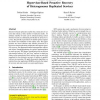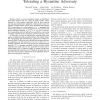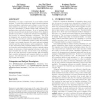267 search results - page 29 / 54 » Self-Adaptation of Fault Tolerance Requirements Using Contra... |
SICHERHEIT
2010
13 years 5 months ago
2010
Intrusion-tolerant replication enables the construction of systems that tolerate a finite number of malicious faults. An arbitrary number of faults can be tolerated during system ...
ICDCS
2010
IEEE
13 years 11 months ago
2010
IEEE
—There are several analytical results on distributed hash tables (DHTs) that can tolerate Byzantine faults. Unfortunately, in such systems, operations such as data retrieval and ...
CCGRID
2006
IEEE
14 years 1 months ago
2006
IEEE
— It is well-understood that increasing redundancy in a system generally improves the availability and dependability of the system. In server clusters, one important form of redu...
DAC
2003
ACM
14 years 8 months ago
2003
ACM
Reseeding is used to improve fault coverage of pseudorandom testing. The seed corresponds to the initial state of the PRPG before filling the scan chain. In this paper, we present...
CODES
2011
IEEE
12 years 7 months ago
2011
IEEE
Reliability is a major requirement for most safety-related systems. To meet this requirement, fault-tolerant techniques such as hardware replication and software re-execution are ...



